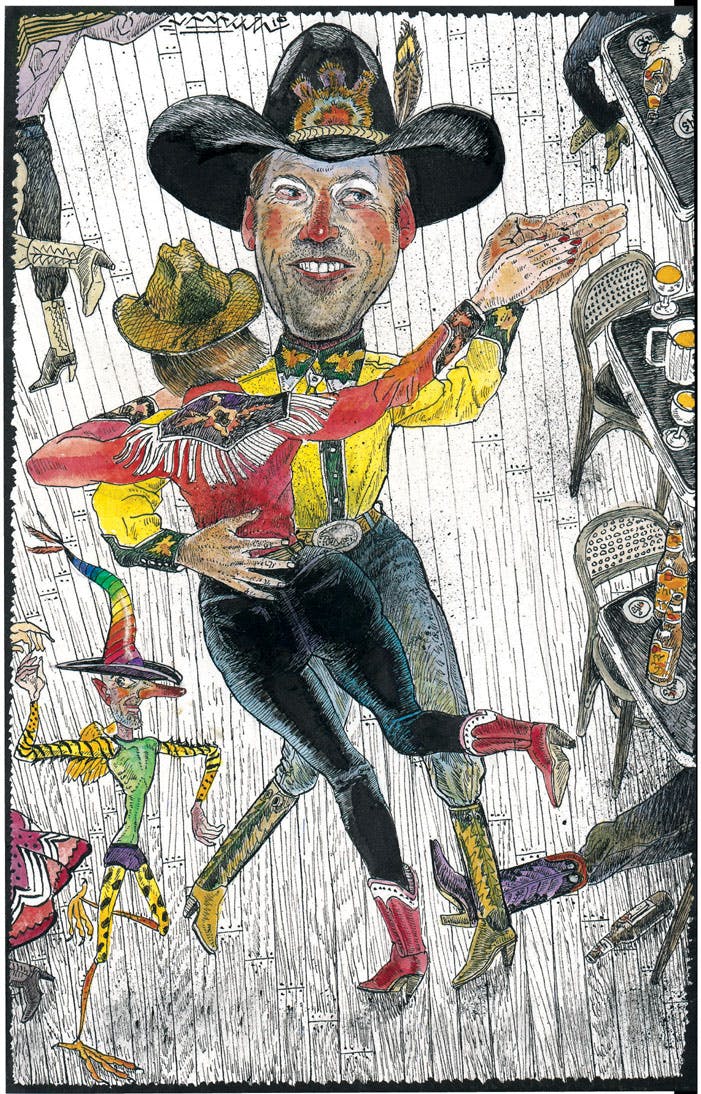
Q: My husband and I go dancing almost every weekend, but I end up dancing with his best buddy more than I do with him. His friend is just a better dancer, and there’s no hanky-panky going on, but I’m starting to feel guilty. Do I need to stick with the one that brung me?
Name Withheld
A: The conventional wisdom would have you reserve your dance card for him that brung you, yes, but the conventional wisdom would also have you stop at five tequilas and refrain from trying to “sit in” with the band as guest vocalist on the “Cotton-Eyed Joe.” Where’s the fun in that? The Texanist learned how to navigate a dance floor from overbearing junior cotillion chaperones at the Knights of Columbus hall in Temple. (Another flaw in the conventional wisdom: Back then the one that brung you was often your mom.) These ladies instilled in him a firm conviction that dance cards are made to be filled. And if it requires the efforts of multiple partners to fill yours, you should not feel ashamed. The real question is not whether you must dance only with the one that brung you but why the one that brung you didn’t also brung his dancing shoes. If it’s because he would rather drink beer to excess and dribble tobacco spit down his chin and onto the crisp white Western shirt you gave him for Christmas, then he has only brung the situation on himself and you should not feel guilty.
Q: I’m in the midst of an extended vacation in New York City. Everyone around here knows I’m from Texas (all football and barbecue conversations go directly to me), but they all say, “You don’t have an accent!?” It hurts. How do I get it back without looking like a jackass?
Christi Clifford, Brooklyn
A: A good drawl (mild, medium, or Lufkin) is a useful part of every Texan’s ensemble. Think of it like the tail plumage of the male peafowl, which when fanned leaves no doubt in the minds of nearby birds as to who is the peacock in the room. There are occasions, usually up north, when Texans find it advantageous to parade around with their feathers flared, so to speak (see Ann Richards, Ross Perot, and George W. Bush). And yet, as the former president can attest, extended stays in localities where the dialect is different from one’s own can often have a distorting effect on the native tongue. Once, after a sabbatical in the Scottish Highlands, the Texanist became so flummoxed trying to maintain his drawl that he began to sound like a confab of angry donkeys. The internal turmoil caused by the disappearance of your accent is painful. You have lost your plumage and must appear to all as a pigeon or grackle and not the splendid peacock you are. The only way to guarantee its safe return is for you yourself to return home. And it will when you do. You could try forcing it, but you’ll likely just end up sounding like a bad imitation of that guy who does the Whataburger ads, or a jackass, which you are rightly hoping to avoid.
Q: My best friend and I hope you can settle an argument for us. She recently bought a Toyota 4Runner, and every time she talks about it she calls it her “truck.” As a native Texan who as a teenager enjoyed sitting in a truck’s “sweetheart seat,” I believe a truck has to have an open bed in the back. I say she’s driving an SUV; she says it’s a truck. Who’s right?
Christal Hice, Land O’ Lakes, Florida
A: Shortly after your letter arrived, the Texanist received a lengthy missive from a woman named Mikaila Adams, of Houston. Ms. Adams says she is your best friend (and that you drive a Saab). In her letter, she presents her side of things, relying strongly on the “license plate defense.” To wit: Having observed SUVs bearing “Truck” plates issued by the Texas Department of Motor Vehicles, Ms. Adams therefore makes the reasonable inference that her 4Runner could be considered a truck. She cannot be blamed for reaching this conclusion, but the fact is that our DMV dispenses plates with alarming disregard for fixed vehicular categories. Currently, an SUV owner such as Ms. Adams may opt to register her 4Runner in Texas as either a truck or a passenger vehicle, yet another instance of glorifying the individual’s right to choose without considering the wider social ramifications. Everyone knows that a vehicle with an open bed in the back is called a pickup truck, or just a pickup. But since the Texas DMV does not make such a distinction, in the case of Hice v. Adams, the Texanist must call a draw and order you to shake hands and buy each other a can of motor oil. As for the Texas DMV, he finds it guilty of sowing confusion in the land.
Q: I have just married a Texan, and recently we got pregnant. It’s a boy! I was hoping for a girl, only because I thought we might be able to avoid the following dilemma. I am a peace-loving gal from Chicago, but my husband says guns and knives are part of his culture and a rite of passage for boys that happens around age fourteen. I say no kid of mine needs a gun. Is this truly a cultural issue?
Jen Graf Sims, Haleiwa, Hawaii
A: The Texanist gathers that your husband has up until now been hesitant to tell you that this “rite of passage” is actually a legally mandated procedure in the state of Texas. It is time you knew. According to the state constitution, at the age of fourteen, all Texas boys are required to participate in a full-scale weaponization. The occasion is marked by a solemn ritual usually held in the woods. The governor is present, as are three Texas Rangers and at least one Dallas Cowboys cheerleader. The boy is presented with a razor-sharp bowie knife and with it must successfully shave his left arm from elbow to hand (if his arm hair has not come in yet, he may shave the fuzz from one side of a plump peach). Having completed this difficult trial, he is then made to demonstrate his abilities with a Colt six-shooter of very high caliber by blasting a beer can off his little brother’s head at fifty paces (in lieu of a little brother, a beloved family pet may be used). All of this is done by firelight and accompanied by the guttural chanting of the boy’s living grandparents. Since you reside outside the state, you are free to abstain, but you must understand that your son will be missing out on one of the great traditions of Texas masculinity. Another great tradition, of course, is telling whoppers.








